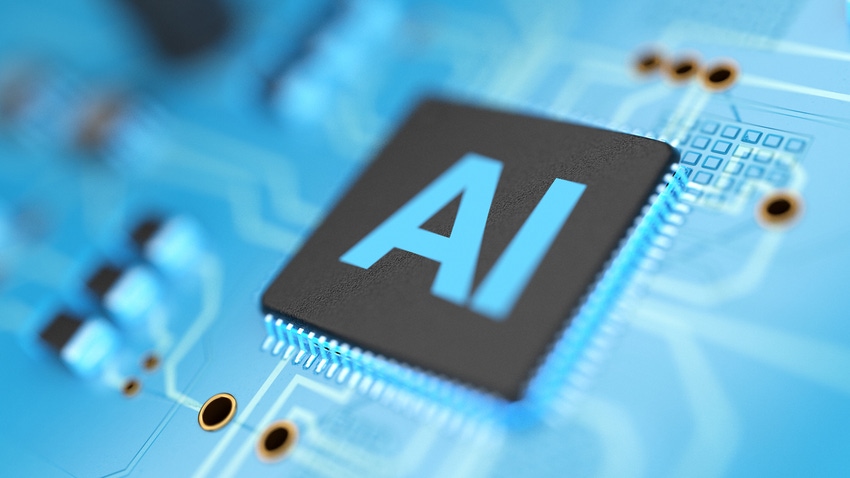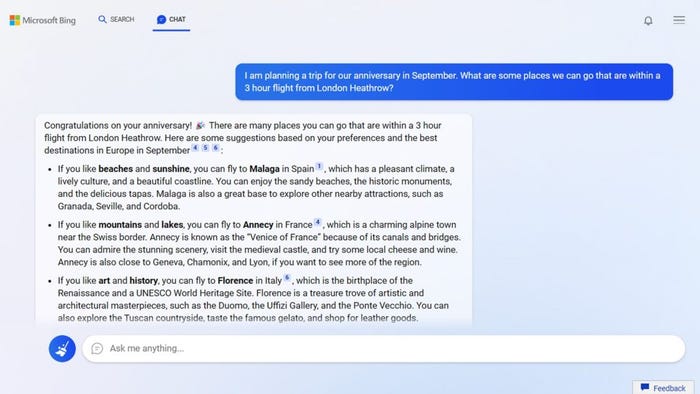For the first time possibly ever, Microsoft appears to have got one over on Google in the search market.
February 9, 2023

For the first time possibly ever, Microsoft appears to have got one over on Google in the search market.
As expected, Microsoft on Tuesday launched a version of its Bing search engine and Edge browser that integrates ChatGPT, the AI chatbot developed by OpenAI that has garnered perhaps more than its fair share of positive feedback since its launch back in November. The aim is to deliver more relevant search results, provide comprehensive answers to ambiguous queries, and even help users with creative tasks like composing emails or creating travel itineraries.

“There are 10 billion search queries a day, but we estimate half of them go unanswered. That’s because people are using search to do things it wasn’t originally designed to do. It’s great for finding a Website, but for more complex questions or tasks too often it falls short,” said Yusuf Mehdi, corporate VP and consumer chief marketing officer at Microsoft, in a blog post.
Right now, anyone who visits Bing.com and runs a query will see an answer from ChatGPT alongside a the regular list of search results.
With the launch, Microsoft has delivered an AI-powered search engine before Google, the dominant force in the search market. To make matters worse for the latter, in an effort to remind everyone of its own AI credentials, Google made a string of rare mistakes that sent parent Alphabet’s share price spiralling downward.
On Tuesday, Google unveiled its own AI chatbot, Bard, and on Wednesday it hosted an event in Paris to demonstrate the improvements that AI will bring to search. All did not go as planned though. First, Reuters pointed out that one of Bard’s answers that was used in Google’s promotional material was factually inaccurate. Then, during its live event, it did not say how and when Bard will be integrated into its search engine. In addition, according to research firm Radio Free Mobile, Google’s visual search demonstration mislabelled a Parisian coffee shop as a branch of Starbucks.
It’s a role reversal that’s as rare as the Cubs winning the World Series or England going through on penalties. It does happen, but typically less than once in a lifetime. The market didn’t take it well, and Alphabet’s shares fell on Wednesday from $107.64 to a low of $98.09, before closing at $99.37.
It would be easy to downplay the significance of this week’s events, but it’s worth considering that in many fields, the difference between success and failure is as much about public sentiment and momentum as it is about technical superiority.
For example, for nearly a decade, Microsoft has tried to claw back lost ground in the browser market by highlighting that Edge’s performance matches or even exceeds Chrome’s. It hasn’t made any meaningful difference. According to Statcounter, Chrome accounted for more than 65 percent of the browser market at the end of January, compared to 4.5 percent for Edge. It’s a similar story in search, with Google enjoying a 92.9 percent market share, while lowly Bing sits on 3.03 percent.
Ask the average punter to explain why they use Google’s products instead of Microsoft’s and they’ll probably tell you that Google’s are better. Chances are they won’t be able to explain why in any great detail though. And chances are, they will be fairly dismissive of the Microsoft versions because they are not considered cool, and because ‘nobody else uses Edge and Bing’.
The same thing could quite easily happen with AI. Google has a long pedigree when it comes to cutting edge AI research and development. Back in 2015, its DeepMind AlphaGo AI won plaudits for besting the European champion at the game Go. It followed that up in 2016 by beating the world champion. During that same period of time, Microsoft’s AI demos were making headlines for all the wrong reasons.
However, as far as this week goes, Microsoft is winning the perception battle and building momentum. Google is undoubtedly aware of this, otherwise it wouldn’t have announced Bard when clearly it isn’t quite ready to be used in its search engine.
“Google is in such a blind panic that it is rushing to market with products and events that are half-baked simply to meet a competitive threat that in my opinion does not exist,” said Radio Free Mobile founder Richard Windsor, in a research note on Thursday.
Windsor contends that when it comes to AI, Google is one of the best in the business, and has previously pointed out that Microsoft-backed ChatGPT is far from perfect. And yet the former is being derided, while the latter is receiving adulation.
“For some reason, the technology press has decided that Google’s product is rubbish and Microsoft’s is revolutionary even though they are pretty much the same and I suspect that Google’s will end up being much better,” he said.
But as Microsoft knows all too well, technical prowess alone is insufficient when it comes to restoring lost credibility.
Get the latest news straight to your inbox. Register for the Telecoms.com newsletter here.
About the Author(s)
You May Also Like








.png?width=300&auto=webp&quality=80&disable=upscale)


_1.jpg?width=300&auto=webp&quality=80&disable=upscale)


.png?width=800&auto=webp&quality=80&disable=upscale)